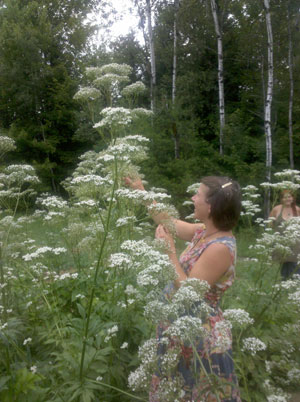Numen Resource Guide

photo by Sandra Lory
Herbal Support for Depression
By Larken Bunce, MS, Clinical Herbalist & Co-Director Vermont Center for Integrative Herbalism, Montpelier, VT ©2009
Depression has reached epidemic proportions in industrialized cultures in the past 30 years, with an estimated 15% of the population expected to experience depression in their lifetime. Women are twice as likely to suffer as men, as are those with family history of depression and early-life stress.
Symptoms of depression include lasting negative mood or loss of interest in pleasurable experiences; changes in appetite and/or body weight, sleeping patterns, ability to concentrate, psychomotor function, or energy levels; feelings of low self-worth or guilt; and thoughts about death or suicide. Some people experience these symptoms more severely or more consistently than others; however, any level of depression can impact personal relationships, work life, and overall health.
Whether depression is circumstantial—that is, in response to a particular event—or a chronic condition experienced over long periods, herbs can assist in elevating mood, increasing concentration, improving sleep and energy levels, and regulating appetite. In our northern climate, some people experience depression only in the winter (seasonal affective disorder) and herbs, along with dietary shifts and perhaps vitamin D, can offer good support here, too.
Herbalists recommend stimulating nervines, which support and enliven the central nervous system, shifting both our internal chemical environment and our perception of our external environment. Adaptogens, working through the endocrine system, help us manage the stress that often contributes to depression. Conveniently, many of these herbs simultaneously improve appetite, brain circulation, energy, and sleep quality.
Mood-enhancing herbs to try alone or in combination
Lemon balm (Melissa officinalis): quick-acting, gentle remedy that lifts the spirits, Melissa refers to the bees that so love this plant—we love it too for the sweetness it brings, especially for sadness accompanying mild depression and/or anxiety; particularly useful for menopausal depression; also a gentle digestive remedy; good tea, tincture, glycerite.
Rosemary (Rosmarinus officinalis): for depression with general debility, sluggish appetite, cardiovascular deficiency, and cloudy thinking (sometimes called "vegetative"); dispels despondency and worry; increases concentration and memory by increasing blood flow to brain; especially effective to dispel brain fog of menopause and aging; its warming effect can dispel chilly toes along with winter blues; great as tincture and added to soups.
Lavender (Lavandula officinalis): can be used for depression characterized by low motivation, energy, and appetite, as well as for depression coupled with anxiety; helpful when a sense of loss affects the heart; calms the mind while also stimulating gently; use in small proportions in tinctures or tea blends—the flavor is strong.
Rose petal (Rosa spp): we all know the sweet smell of a wild rose can bring delight, but we rarely think about this plant for healing; rose has an uplifting, restoring, and calming effect on the nervous system, lifts depression, dispels mental and physical fatigue, and soothes irritability, grief, and anger; the essential oil can also be used for depression, especially that caused by lack of love or intimacy in one's life; lovely as tea (as a small part of a blend) or as a tasty glycerite!
Damiana (Turnera diffusa): an excellent tonic in "vegetative" depression, as well as when depression is accompanied by anxiety; has a reputation for kindling sexual desire; a wonderful tea for winter-morning "blahs" or general feelings of mental or physical inertia.
Saint John's wort (Hypericum perforatum): while this plant has had some mixed press, it has proven itself in clinical settings and through research to be quite effective for mild to moderate unipolar depression and seasonal affective disorder; blooming in our fields right around summer solstice, it brings the sun's bright spirit into the depths of winter, elevating mood, and relieving fatigue and negative sense of self; best if combined with other mood-supporting herbs, especially lemon balm; not to be used with antidepressants or other prescription medications without professional advice; can take 4–6 weeks to reach full effectiveness; take as a tea, tincture, or capsule (standardized extract).

photo by Larken Bunce
Valerian root (Valeriana officinalis): historically used for "feeble brain circulation" with depression and despondency; current research has found valerian to be as effective as a leading antidepressant (Elavil) when combined with St. John's wort; best as tincture.
Mood-enhancing Tea
2 parts lemon balm
2 parts aat tops
1 part damiana
1/2 part rose petals
Combine herbs and place 1–2 tablespoons of dried herbs in 8–16 oz. of boiled water, allowing them to steep covered for 15 minutes. Drink 3 times per day or fill a thermos and drink throughout the day.
Adaptogenic Herbs (to try alongside your tea)
Schisandra berry (Schisandra chinensis): invigorating to the mind as well as the digestion; excellent for exhausted and unfocused folks; also excellent for liver damage and regeneration (take with food—can give a little heartburn).
Eleuthero root (Eleutherococcus senticosus): a fairly "neutral" adaptogen, it's not too stimulating for most folks, but does increase energy and immune function in the short term and over time.
Holy basil leaf (Ocimum sanctum): like culinary basil, this herb supports digestion and enhances circulation, encouraging clear thinking; a great remedy to consider where blood sugar levels are high; a powerful anti-inflammatory and antioxidant; makes great tea or available as capsule or tincture.
Flower Essences for Depression
These gentle, vibrational remedies specifically address emotional and psychological distress. A few of my favorites are borage, elm, gentian, larch, mustard, and white chestnut. All of these, except borage, are available in the Bach line; more information is available wherever essences are sold to help you select the most appropriate essence for you.
Text development financially supported by the Herbalist in the Aisle program of Hunger Mountain Coop, Montpelier, VT.



